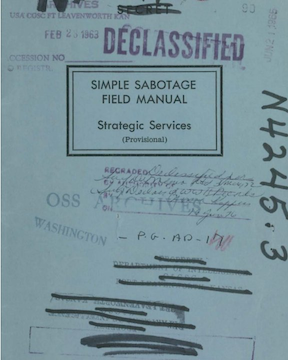- Tags:: 📚Books , My management principles, values, and practices
- Author:: The CIA (in its previous form, the OSS)
- Liked:: 6
- Link:: HSDL - Simple Sabotage Field Manual
- Source date:: 1944-01-17
- Finished date:: 2021-12-01
- Cover::

…for use by OSS agents in motivating or recruiting potential foreign saboteurs. (…) The since-declassified booklet describes ways for civilians to inflict sabotage through ordinary means, so as to minimize undue attention. According to the document, saboteur-recruits were most often U.S. sympathizers keen to disrupt war efforts against the U.S. during World War Two. The booklet contains instructions for destabilizing or reducing progress and productivity by non-violent means.
The most interesting part is the “General Interference with Organizations and Production”:
(1) Insist on doing everything through “channels.” Never permit short-cuts to be taken in order to expedite decisions. (2) Make “speeches.” Talk as frequently as possible and at great length. Illustrate your “points” by long anecdotes and accounts of personal experiences. Never hesitate to make a few appropriate “patriotic” comments. (3) When possible, refer all matters to committees, for “further study and consideration.” Attempt to make the committees as large as possible — never less than five. (4) Bring up irrelevant issues as frequently as possible. (5) Haggle over precise wordings of communications, minutes, resolutions. (6) Refer back to matters decided upon at the last meeting and attempt to re-open the question of the advisability of that decision. (7) Advocate “caution.” Be “reasonable” and urge your fellow-conferees to be “reasonable” and avoid haste which might result in embarrassments or difficulties later on. (8) Be worried about the propriety of any decision — raise the question of whether such action as is contemplated lies within the jurisdiction of the group or whether it might conflict with the policy of some higher echelon.